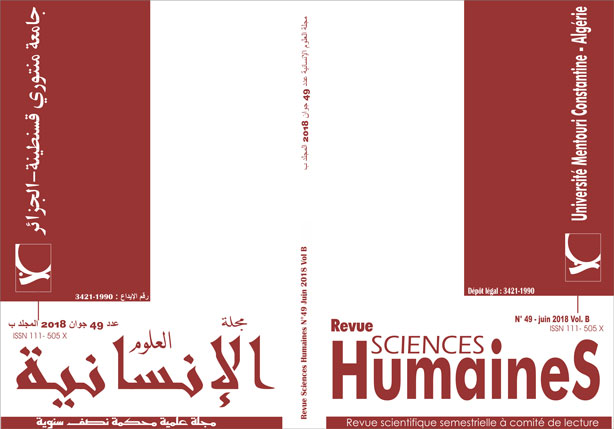Investigating Algerian Use of English Modals: The Case of Second Year Master Students of English at the University “Frères Mentouri”, Constantine 1
الكلمات المفتاحية:
deontic، epistemic، modality، English modal verbs، performance، competenceالملخص
The acquisition and application of English modals in appropriate contexts are among the essential aspects of second and foreign language acquisition. Thus, the current study is carried out in order to investigate the use of English modal verbs by Algerian university learners of English. The study is intended to identify to what extent the participants could acquire the functional properties of modal verbs. It also explores the most challenging aspects in the acquisition of modal verbs. Our study is an attempt to shed more light on the proficiency level of learners’ performance in acquiring modal verbs. In order to fulfill the intended aims, 116 second year master students of English were assessed on their use of modals. The data analysis revealed that the students showed a low performance and faced some ambiguities in identifying the appropriate English modal.التنزيلات
المراجع
Aarts, B. (2011). Oxford modern English grammar. New York, NY: Oxford University Press.
Azar, B. S. (2000). Understanding and using English grammar (3rd ed.). White Plains, NY: Pearson Education.
Biber, D., Conrad, S. & Leech, G. (2002). Longman student grammar of spoken and written English. (3rd Ed.). England: Pearson Education Limited.
Byrd, P. (2004). The difficult-easy matrix: Analyzing grammar from two points of view. Retrieved March 8, 2004, from http://www.gsu.edu/~eslhpb/grammar/difmatrx.htm
Celce-Murcia, M. & Larsen-Freeman, D. (1999).The Grammar book: an ESL/EFL teacher’scourse. 2nd ed. Boston: Heinle&Heinle.
Coates, J. (1983). The Semantics of the Modal Auxiliaries (p. 269). London: Croom Helm.
Collins, P. (2009). Modals and Quasi-Modals in English. Amsterdam: Rodopi.
Ferris, D. R. (2002). Treatment of Errors in Second Language Student Writing. Ann Arbor: The University of Michigan.
Thompson, M. (2002). Modals in English language teaching. [Online]
Available:http://www.telusplanet.net/linguisticsissues/modalsinteaching.html (21 January, 2010).
Corder, S. P. 1974. The significance of learners' errors. Ins RICHARDS, 3ack C. (ed). Error analysis, perspective on second language acquisition. London, Longman, 19-27.
DeKeyser, R. (2005). What makes learning second-language grammar difficult? A review of issues. Language Learning, 55(S1), 1-25.
Greenbaum, S., & Quirk, R. (1990). A student’s grammar of the English language. Essex, UK: Addison Wesley Longman Ltd.
Groefsema, Marjolein. "Can, may, must and should: a Relevance-theoretic approach." Journal of Linguistics 31 (1995): 53-79.
Hobson, R.P.( 1990). On acquiring knowledge about people and the capacity to pretend : Response to Leslie. Psychological Review, 97, 114-124
Huddleston, R. (1995). The case against a future tense in English. Studies in anguage, 19, 399-446.
Hymes, D.H. (1972) “On Communicative Competence” In: J.B. Pride and J. Holmes (eds) Sociolinguistics. Selected Readings. Harmondsworth: Penguin, pp. 269-293.(Part 2).
Jackson, Howard. 1990. Grammar and Meaning: A Semantic Approach to English Grammar. Vol. Learning about language. London: Longman.
James, C. 1988 Errors in Language Learning and Use: Exploring Error Analysis. Harlow, Essex: Addison Wesley Longman Limited.
Kasper, G. ( 1979) Communication strategies : Modality reduction. Interlangauge Studies Bultin Utrcht 4:266-83.
Lyons, J. (1977). Semantics, 2. Cambridge: Cambridge University.
McArthur, T. (1992). The Oxford Companion to the English Language. New York: Oxford University Press.
Master, P. (1996). Systems in English grammar: An introduction for language teachers. New York: Prentice Hall Regents.
Mindt, D. (1995). An Empirical Grammar of the English Verb: Modal Verbs. Berlin: Cornelsen.
Moore, M. (1997). Theory of transactional distance. In D. Keegan (Ed.), Theoretical principles of distance education (pp. 22–38). New York: Routledge
Palmer, F. (1979) Modality and the English Modals. Longman: Longman Inc.
Palmer, F. (1990) Modality and the English Modals. New York: Longman Inc. 2nd edition.
Papafragou, A. (2000), Modality: Issues in the Semantics–pragmatics Interface. Amsterdam: Elsevier Science.
Quirk, R., Greenbaum, S., Leech, G., & Svartvik, J. (1985). A comprehensive grammar of the English language. Essex, UK: Pearson Education Limited.
Robson, Stuart. 1992. Javanese grammar for students. Clayton, Australia: Center of Southeast Asian Studies, Monash University
Stern, H H (1992). Issues and options in language teaching (edited posthumously by Patrick Allen & Birgit Harley). Oxford: Oxford University Press.
Swan, M. (1995). Practical English usage (2nd ed.). Oxford: Oxford University Press.
Tang, Ting-chi. 1992. Studies on Chinese Morphology and Syntax 4. Taipei: Student Book Co.
Yule, George (1998) Explaining English Grammar. Oxford: Oxford University Press.
















